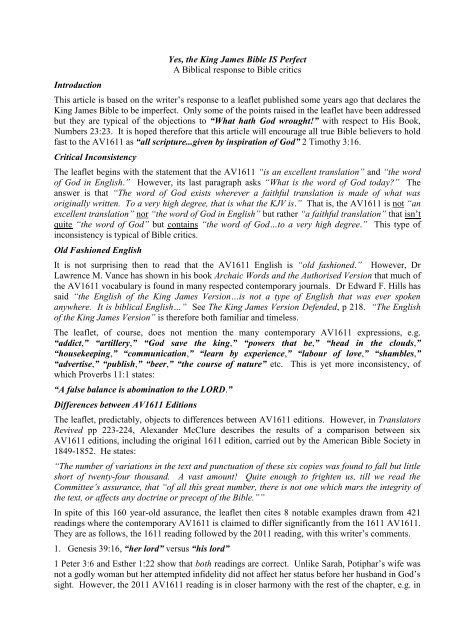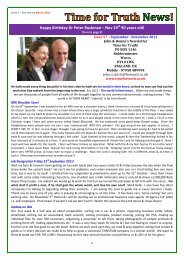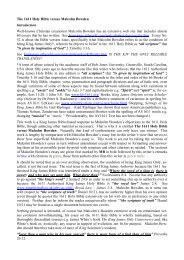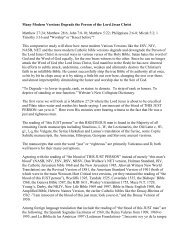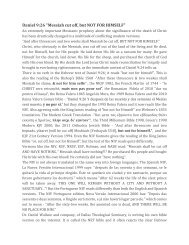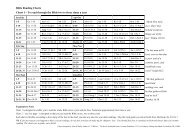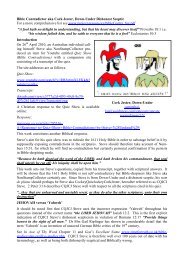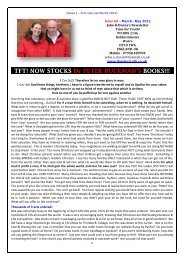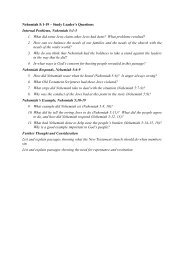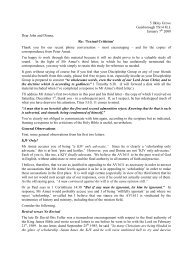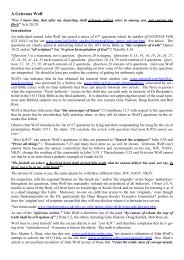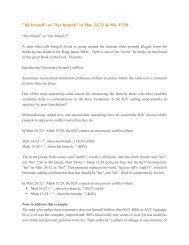Yes, the King James Bible IS Perfect A Biblical ... - Time for Truth
Yes, the King James Bible IS Perfect A Biblical ... - Time for Truth
Yes, the King James Bible IS Perfect A Biblical ... - Time for Truth
- No tags were found...
You also want an ePaper? Increase the reach of your titles
YUMPU automatically turns print PDFs into web optimized ePapers that Google loves.
Introduction<strong>Yes</strong>, <strong>the</strong> <strong>King</strong> <strong>James</strong> <strong>Bible</strong> <strong>IS</strong> <strong>Perfect</strong>A <strong>Biblical</strong> response to <strong>Bible</strong> criticsThis article is based on <strong>the</strong> writer’s response to a leaflet published some years ago that declares <strong>the</strong><strong>King</strong> <strong>James</strong> <strong>Bible</strong> to be imperfect. Only some of <strong>the</strong> points raised in <strong>the</strong> leaflet have been addressedbut <strong>the</strong>y are typical of <strong>the</strong> objections to “What hath God wrought!” with respect to His Book,Numbers 23:23. It is hoped <strong>the</strong>re<strong>for</strong>e that this article will encourage all true <strong>Bible</strong> believers to holdfast to <strong>the</strong> AV1611 as “all scripture...given by inspiration of God” 2 Timothy 3:16.Critical InconsistencyThe leaflet begins with <strong>the</strong> statement that <strong>the</strong> AV1611 “is an excellent translation” and “<strong>the</strong> wordof God in English.” However, its last paragraph asks “What is <strong>the</strong> word of God today?” Theanswer is that “The word of God exists wherever a faithful translation is made of what wasoriginally written. To a very high degree, that is what <strong>the</strong> KJV is.” That is, <strong>the</strong> AV1611 is not “anexcellent translation” nor “<strong>the</strong> word of God in English” but ra<strong>the</strong>r “a faithful translation” that isn’tquite “<strong>the</strong> word of God” but contains “<strong>the</strong> word of God…to a very high degree.” This type ofinconsistency is typical of <strong>Bible</strong> critics.Old Fashioned EnglishIt is not surprising <strong>the</strong>n to read that <strong>the</strong> AV1611 English is “old fashioned.” However, DrLawrence M. Vance has shown in his book Archaic Words and <strong>the</strong> Authorised Version that much of<strong>the</strong> AV1611 vocabulary is found in many respected contemporary journals. Dr Edward F. Hills hassaid “<strong>the</strong> English of <strong>the</strong> <strong>King</strong> <strong>James</strong> Version…is not a type of English that was ever spokenanywhere. It is biblical English…” See The <strong>King</strong> <strong>James</strong> Version Defended, p 218. “The Englishof <strong>the</strong> <strong>King</strong> <strong>James</strong> Version” is <strong>the</strong>re<strong>for</strong>e both familiar and timeless.The leaflet, of course, does not mention <strong>the</strong> many contemporary AV1611 expressions, e.g.“addict,” “artillery,” “God save <strong>the</strong> king,” “powers that be,” “head in <strong>the</strong> clouds,”“housekeeping,” “communication,” “learn by experience,” “labour of love,” “shambles,”“advertise,” “publish,” “beer,” “<strong>the</strong> course of nature” etc. This is yet more inconsistency, ofwhich Proverbs 11:1 states:“A false balance is abomination to <strong>the</strong> LORD.”Differences between AV1611 EditionsThe leaflet, predictably, objects to differences between AV1611 editions. However, in TranslatorsRevived pp 223-224, Alexander McClure describes <strong>the</strong> results of a comparison between sixAV1611 editions, including <strong>the</strong> original 1611 edition, carried out by <strong>the</strong> American <strong>Bible</strong> Society in1849-1852. He states:“The number of variations in <strong>the</strong> text and punctuation of <strong>the</strong>se six copies was found to fall but littleshort of twenty-four thousand. A vast amount! Quite enough to frighten us, till we read <strong>the</strong>Committee’s assurance, that “of all this great number, <strong>the</strong>re is not one which mars <strong>the</strong> integrity of<strong>the</strong> text, or affects any doctrine or precept of <strong>the</strong> <strong>Bible</strong>.””In spite of this 160 year-old assurance, <strong>the</strong> leaflet <strong>the</strong>n cites 8 notable examples drawn from 421readings where <strong>the</strong> contemporary AV1611 is claimed to differ significantly from <strong>the</strong> 1611 AV1611.They are as follows, <strong>the</strong> 1611 reading followed by <strong>the</strong> 2011 reading, with this writer’s comments.1. Genesis 39:16, “her lord” versus “his lord”1 Peter 3:6 and Es<strong>the</strong>r 1:22 show that both readings are correct. Unlike Sarah, Potiphar’s wife wasnot a godly woman but her attempted infidelity did not affect her status be<strong>for</strong>e her husband in God’ssight. However, <strong>the</strong> 2011 AV1611 reading is in closer harmony with <strong>the</strong> rest of <strong>the</strong> chapter, e.g. in
2verses 2, 3, 5, 8, 9, 19, 20, 21, 23 and yields more evidence to show that Joseph was a type of <strong>the</strong>Lord Jesus Christ.2. Leviticus 20:11, “shall be put to death” versus “shall surely be put to death”The expression “shall surely be put to death” or “shall be surely put to death” is found inLeviticus 20:2, 9, 10, 12, 13, 15, 16 in both editions. The omission of “surely” from verse 11 in <strong>the</strong>1611 edition is almost certainly a printing error but <strong>the</strong> text is not affected.3. Deuteronomy 5:29, “my commandments” versus “all my commandments”The actual expression in both editions is “…my commandments always.” Moreover, <strong>the</strong>expressions “all <strong>the</strong> commandments, and <strong>the</strong> statutes, and <strong>the</strong> judgements” and “all <strong>the</strong> wayswhich <strong>the</strong> Lord your God hath commanded you” are found in verses 31 and 33 of both editions.The 2011 edition simply has added emphasis.4. 2 <strong>King</strong>s 11:10, “in <strong>the</strong> temple” versus “in <strong>the</strong> temple of <strong>the</strong> Lord”2 <strong>King</strong>s 11 reads “house of <strong>the</strong> Lord” in verses 3, 4 twice, 7, 15, 18, 19 and “temple of <strong>the</strong> Lord”in verse 13 so <strong>the</strong>re is no contradiction between editions about <strong>the</strong> identity of <strong>the</strong> “<strong>the</strong> temple” inverse 10. Both readings are correct. However “<strong>the</strong> temple” occurs three times in verse 11. Theexpression in verse 10 could easily have been associated with <strong>the</strong> repetitions in <strong>the</strong> next verse by <strong>the</strong>printers in 1611.5. Isaiah 49:13, “God hath com<strong>for</strong>ted” versus “<strong>the</strong> Lord hath com<strong>for</strong>ted”Isaiah 49 reads “<strong>the</strong> Lord” in verses 1, 4, 5, 7 twice, 8, 14 with “my Lord”, 18, 23, 25, 26, “<strong>the</strong>Lord,…my God” in verses 4, 5 and “<strong>the</strong> Lord God” in verse 22 so that both editions are consistentwith respect to <strong>the</strong> identity of <strong>the</strong> Com<strong>for</strong>ter in verse 13. That <strong>the</strong> editions do not read verbatim atthis point <strong>the</strong>re<strong>for</strong>e does not mean that one or <strong>the</strong> o<strong>the</strong>r is ‘imperfect’ – apart from printing errors.6. Ezekiel 24:7, “poured it upon <strong>the</strong> ground” versus “poured it not upon <strong>the</strong> ground”The 1611 reading is a printing error. Verse 8 states “I have set her blood upon <strong>the</strong> top of a rock,that it should not be covered.”7. 1 Timothy 1:4, “edifying” versus “godly edifying”This “edifying” is “in faith” and contrasts with <strong>the</strong> strictures of “<strong>the</strong> law” that “is not made <strong>for</strong> arighteous man, but…<strong>for</strong> <strong>the</strong> ungodly” verse 9. There is no uncertainty in ei<strong>the</strong>r edition about <strong>the</strong>“godly” nature of <strong>the</strong> edifying and no inconsistency between editions.8. 1 John 5:12, “<strong>the</strong> Son” versus “<strong>the</strong> Son of God”1 John 5 reads “born of God” in verse 1 and “Son of God” in verses 5, 10, 13 twice and in 20 with“Son Jesus Christ.” Both editions are clear about <strong>the</strong> identity of “<strong>the</strong> Son” in verse 12 although<strong>the</strong> AV1611 reading is more explicit. It was introduced in 1638, according to Dr. Scrivener, TheAuthorized Version of <strong>the</strong> English <strong>Bible</strong> (1611), p 193. God has clearly honoured <strong>the</strong> insertionsince <strong>the</strong>n and all <strong>the</strong> now-2011 readings.The leaflet never<strong>the</strong>less asserts that <strong>the</strong> need <strong>for</strong> such modifications “spells <strong>the</strong> end of <strong>the</strong> myth of a‘perfectly preserved KJV’.” The American <strong>Bible</strong> Society had a much more realistic appraisal:“That <strong>the</strong> edition of 1611, although prepared with very great care, was not free from typographicalerrors; and that, while most of <strong>the</strong>se were corrected in <strong>the</strong> edition of 1613, o<strong>the</strong>rs in much greaternumber were never<strong>the</strong>less <strong>the</strong>n introduced, which have since been removed. That <strong>the</strong> revision ofDr. Blaney made by collating <strong>the</strong> <strong>the</strong>n current editions of Ox<strong>for</strong>d and Cambridge with those of 1611and 1701 had <strong>for</strong> its main object to restore <strong>the</strong> text of <strong>the</strong> English <strong>Bible</strong> to its original purity: andthat this was successfully accomplished.”God’s Word Be<strong>for</strong>e 1611
3Typically <strong>for</strong> such publications, <strong>the</strong> leaflet asks “Where was <strong>the</strong> perfect, inerrant, preserved wordof God in 1610?” Dr. Miles Smith explains in The Translators to <strong>the</strong> Readers.“We are so far off from condemning any of <strong>the</strong>ir labors that travailed be<strong>for</strong>e us in this kind, ei<strong>the</strong>rin this land or beyond sea, ei<strong>the</strong>r in <strong>King</strong> Henry’s time, or <strong>King</strong> Edward’s (if <strong>the</strong>re were anytranslation, or correction of a translation in his time) or Queen Elizabeth’s of ever-renownedmemory, that we acknowledge <strong>the</strong>m to have been raised up of God, <strong>for</strong> <strong>the</strong> building and furnishingof his Church, and that <strong>the</strong>y deserve to be had of us and of posterity in everlasting remembrance.“Truly (good Christian Reader) we never thought from <strong>the</strong> beginning, that we should need to makea new Translation, nor yet to make of a bad one a good one…but to make a good one better, or outof many good ones, one principal good one, not justly to be excepted against; that hath been ourendeavor, that our mark.”Marginal DifferencesAgain, typically, <strong>the</strong> leaflet states that “The KJV translators suggest thousands of corrections...[<strong>the</strong>1611 translators] did not believe <strong>the</strong>y had picked exactly <strong>the</strong> right word or phrase in every case.They included <strong>the</strong> following in <strong>the</strong> margin: 4,223 more literal meanings, 2,738 alternativetranslations and 104 variant readings.”The marginal insertions show that <strong>the</strong> AV1611 translators were honest researchers. Of <strong>the</strong>ir ef<strong>for</strong>ts,<strong>the</strong> Trinitarian <strong>Bible</strong> Society stated in Fruit Among The Leaves, Quarterly Record, July-September1980, No. 472 that “In most cases <strong>the</strong> reading in <strong>the</strong> text of <strong>the</strong> Authorised Version is superior to<strong>the</strong> alternative given in <strong>the</strong> margin.” Significantly, <strong>the</strong> TBS has not identified any inferior readingsin <strong>the</strong> text.“Imperfections in <strong>the</strong> KJV”The leaflet concludes with 32 ‘imperfections’ in <strong>the</strong> Av1611. See Table 1. The ecumenicalagreement between <strong>the</strong> NIV, NKJV, Rome (JB, Jerusalem <strong>Bible</strong>) and Watchtower (NWT, NewWorld Translation) should be noted.
4Table 1‘X’ Marks <strong>the</strong> Spot - “Imperfections” in <strong>the</strong> AV1611, ‘Corrected’ by Modern VersionsJohn 1:32-1 Peter 1:11: <strong>the</strong> Spirit as “it”, “itself” to “he”, “himself”Acts 12:4:“Easter” to “Passover”Genesis 44:7-Galatians 6:14: “God <strong>for</strong>bid” to e.g. “Never may that happen”, NWT, Romans 6:15Titus 2:13, 2 Peter 1:1: “<strong>the</strong> great God and our Saviour” to “our great God and Saviour”Acts 1:20:“bishoprick” to “office” or similarActs 19:37:“churches” to “temples”Verse ↓ JB NWT NIV NKJVJohn 1:32XRomans 8:16 X X XRomans 8:26 X X X1 Peter 1:11 X XActs 12:4 X X X XGenesis 44:7 X X X XGenesis 44:17 X X X XJoshua 22:29 X X X XJoshua 24:16 X X X X1 Samuel 12:23 X X X X1 Samuel 14:45 X X X X1 Samuel 20:2 X X X XJob 27:5 X X X XLuke 20:16 X XRomans 3:4 X X X XRomans 3:6 X X X XRomans 3:31 X X X XRomans 6:2 X X X XRomans 6:15 X X X XRomans 7:7 X X X XRomans 7:13 X X X XRomans 9:14 X X X XRomans 11:1 X X X XRomans 11:11 X X X X1 Corinthians 6:15 X X X XGalatians 2:17 X X X XGalatians 3:21 X X X XGalatians 6:14 X X XTitus 2:13 X X X2 Peter 1:1 X X X XActs 1:20 X X X XActs 19:37 X X X X‘Improvements’ 91 % 84 % 97 % 94 %ConclusionHaving studied <strong>the</strong> supposed ‘imperfections’ of <strong>the</strong> AV1611 <strong>for</strong> 25 years, this writer agrees with <strong>the</strong>Rev J.A. Moorman’s comment in When The KJV Departs From The “Majority” Text p 28. RevMoorman is addressing ‘minority’ readings in <strong>the</strong> AV1611 but his comments apply to all AV1611*readings. *The 2011 AV1611 readings that God continues to honour.


